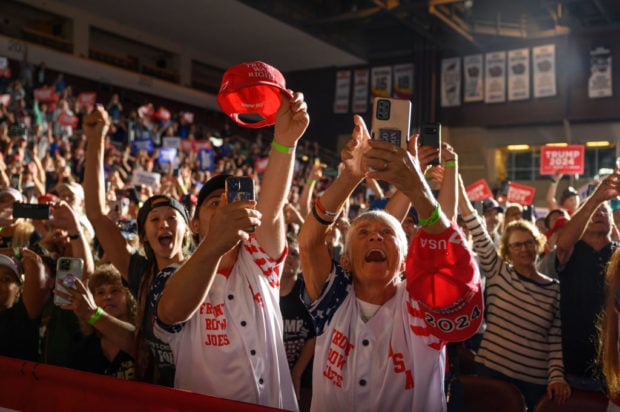Notable “never-Trump”er David Brooks questioned in a New York Times (NYT) op-ed whether liberal elites are actually the “bad guys.”
Brooks noted Trump’s continued domination of the polls despite three indictments. Trump was charged Tuesday with “Conspiracy to defraud the United States,” “Conspiracy to corruptly obstruct and impede the January 6 proceedings” and “Conspiracy against the right to vote and to have one’s vote counted.”
Brooks explained “anti-Trumpers” see themselves as the “good guys” because they are “the forces of progress and enlightenment,” while perceiving “Trumpers are reactionary bigots and authoritarians.”
Brooks then asks readers to question whether “we anti-Trumpers are not the eternal good guys.” (RELATED: ‘That’s How Serious This Is’: Alan Dershowitz Says Jack Smith May Be Indicted If Trump Wins Case)
“In fact, we’re the bad guys,” he writes.

ERIE, PENNSYLVANIA – JULY 29: Trump supporters cheer as former U.S. President Donald Trump enters Erie Insurance Arena for a political rally while campaigning for the GOP nomination in the 2024 election on July 29, 2023 in Erie, Pennsylvania. (Photo by Jeff Swensen/Getty Images)
Brooks goes on to tell of two worlds in America stemming from the past, one in which “high school grads had to go off to fight in Vietnam, but the children of the educated class got college deferments. It continues in the 1970s, when the authorities imposed busing on working-class areas in Boston, but not on the upscale communities like Wellesley where they themselves lived.”
“Over the last decades we’ve taken over whole professions and locked everybody else out,” Brooks writes. “When I began my journalism career in Chicago in the 1980s, there were still some old crusty working-class guys around the newsroom. Now we’re not only a college-dominated profession, we’re an elite-college-dominated profession.”
Brooks then explains how this divide affects the current world we live in.
“Like all elites, we use language and mores as tools to recognize one another and exclude others. Using words like problematic, cisgender, Latinx and intersectional is a sure sign that you’ve got cultural capital coming out of your ears. Meanwhile, members of the less-educated classes have to walk on eggshells, because they never know when we’ve changed the usage rules, so that something that was sayable five years ago now gets you fired.”
Brooks said while he doesn’t think leftist elites are “vicious” and “evil,” the institutions they are a part of have become far too left and make people “in less-educated classes” feel like they are under “economic, political, cultural and moral assault,” which is why they flock to Trump.
“Trump understood that it’s not the entrepreneurs who seem most threatening to workers; it’s the professional class. Trump understood that there was great demand for a leader who would stick his thumb in our eyes on a daily basis and reject the whole epistemic regime that we rode in on.”
Brooks took a moment to criticize Trump as a “monster” who “deserves to go to prison,” before saying it’s the elites’ behavior that makes “Trumpism inevitable.”


